- 현대인에게 글쓰기는 필수다. 창작을 위해서건, 업무를 위해서건 글을 잘 쓴다는 것은 엄청난 축복이다. 미국 저널리스트 진 파울러는 “글쓰기는 쉽다. 백지를 응시하고 앉아 있기만 하면 된다”고 했다. 그러나 거기에 그쳐선 안 된다. 파울러는 “이마에 핏방울이 맺힐 때까지”라는 단서를 붙였다. 좋은 글을 쓰고 싶은 이들에게 귀한 정보가 될 명문장을 가려 모았다.
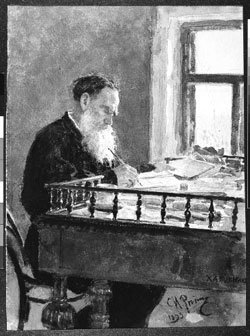
일리야 레핀이 그린 ‘서재에서 집필 중인 톨스토이’
clincher : 결정적인 간결한 표현
repartee : 재치 있는 즉답
tit for tat : 오는 말에 가는 말, 맞받아치기
wording power : 자신의 의사를 상대방에게 전달하는 능력
moving speech : 심금을 울리는 연설
attracting word : 필이 꽂히는 말
word that work : 먹히는 말
what people hear : 사람들이 듣는 말
aspirational language : 소망의 언어
words good to listen to : 듣기에 좋은 말
animating sense of humor : 상대를 고무하는 유머감각
insult: 모욕, 의학용어로 ‘손상’의 뜻, brain insult(damage) 뇌손상
satire : 풍자(사회 제도 등에 대한 비꼼)
sarcasm : 개인을 비꼬는 말(그리스어로 ‘살을 찢다’란 의미)
innuendo : 풍자, 비꼼(라틴어로 ‘by hinting(넌지시)’이란 의미)
put-down : 상대를 납작하게 하는 말
vituperation : 독설, 혹평
sick sense of humor : 상대를 기분 나쁘게 하는 유머감각
curmudgeon comment : 인색한 비평, 심술궂은 비평
acrimony : 호된 말, 표독스러운 말, 신랄한 말
quibble : 둔사(遁辭), 핑계, 변명
quip : 빈정거리는 말, 신랄한 말(참고: quote는 ‘인용문’을 말함)
말 · 표현 · 논변의 전문가는 ‘글 쓰는 사람’, 즉 writer(작가 · 문필가)다. 이들은 논리적 사고력, 치밀한 분석력, 날카로운 통찰력을 가진 언어전략가다. 이들이 펼치는 명문장(felicity)은 그들 정신세계의 결정체다. 특히 이들의 Writing에 대한 clincher는 정말 주옥(珠玉)같다. clincher는 ‘(볼트를) 죄는 도구’ ‘꺾쇠·죔쇠(clamp · cramp)’다. 여기에서 ‘상대를 꼼짝 못하게 하는 말’ ‘결정적인 간결한 표현’ ‘결정적인 논변(論辯)’이란 의미가 생겨났다. Quotations about Writing(글쓰기에 관한 인용문)을 들여다보자.
‘글쓰기는 가면 벗기는 일’
●One ought only to write when one leaves a piece of one?s own flesh in the ink pot, each time one dips one?s pen.(펜을 적실 때마다 잉크병 속에 자기의 살 한 점을 집어넣을 때에만 글을 써야 한다.) -러시아 문호 톨스토이(Leo Tolstoy·1828~1910)
●Writing is easy: All you do is sit staring at a blank sheet of paper until drops of blood form on your forehead.(글쓰기는 쉽다: 백지를 응시하고 앉아 있기만 하면 된다. 이마에 핏방울이 맺힐 때까지.) -미국 저널리스트 진 파울러(Gene Fowler·1890~1960)
●There?s nothing to writing. All you do is sit down at a typewriter and open a vein.(쓸 것이 없다. 타자기 앞에 앉아서 혈관을 절개(切開)하는 일밖에 없다.) -미국 스포츠 칼럼니스트 월터 스미스(Walter Wellesley “Red” Smith·1905~1982)
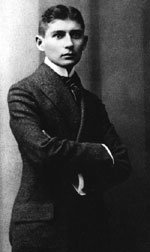
프란츠 카프카.
●Writing is a struggle against silence.(글쓰기란 침묵과 싸우는 전쟁이다.) -멕시코 소설가· 극작가 푸엔테스(Carlos Fuentes·1928~)
●Writing is a way of talking without being interrupted.(글을 쓴다는 것은 방해받지 않고 말하는 하나의 방법이다.) -프랑스 작가 르나르(Jules Renard·1864~1910)
●Writing comes more easily if you have something to say.(말할 것이 있을 때 글 쓰는 일이 더 쉬워진다.) -폴란드 태생 미국 소설가·극작가 애쉬(Shalom Asch·1880~1957)
●Writing is utter solitude, the descent into the cold abyss of oneself.(글을 쓰는 것은 완전한 고독이다. 즉 자기 스스로 차디찬 심연으로 빠져들어 가는 것이다.) -오스트리아 소설가 카프카(Franz Kafka·1883~1924)
●I?m not a very good writer, but I?m an excellent rewriter.(나는 별로 좋은 작가가 아니다. 다만 남보다 자주 고쳐 쓸 뿐이다.) -미국 작가 미케너(James Michener·1907~1997)
●I love writing. I love the swirl and swing of words as they tangle with human emotions.(나는 글쓰기를 좋아한다. 말이 인간의 감정과 얽힐 때 그 말의 소용돌이와 진동을 사랑한다.) -미케너
●How vain it is to sit down to write when you have not stood up to live!(살기 위해 떨치고 일어선 적이 없었음에도 쓰기 위해 앉아야 한다니 이 얼마나 쓸데없는 짓인가!) -미국 사상가·저술가 소로(Henry David Thoreau·1817~1862)
●A writer is somebody for whom writing is more difficult than it is for other people.(작가란 글쓰기가 어려운 사람이다 - 다른 사람에게서 보다 더.) -독일 소설가 토마스 만(Thomas Mann· 1875~1955)
●A story should have a beginning, a middle, and an end - but not necessarily in that order.(이야기는 시작, 중간, 그리고 끝이 있어야 한다. 그러나 반드시 이 순서일 필요는 없다.) -프랑스 영화감독 고다르(Jean-Luc Godard·1930~)
‘작가가 좋다, 글쓰기는 싫다’
●I love being a writer. What I can?t stand is the paperwork.(나는 내가 작가인 것을 좋아한다. 그러나 내가 견딜 수 없는 일은 글 쓰는 일이다.) -미국 소설가 피터 드 브리스(Peter De Vries·1910~1993)
●I do not like to write - I like to have written.(나는 (앞으로) 글을 쓸 것을 좋아하지 않는다. 나는 (이미) 쓴 것을 좋아한다.) - 미국 남녀평등주의자들의 우상 스타이넘(Gloria Marie Steinem·1934~)
●Storytelling reveals meaning without committing the error of defining it.(‘이야기하기’는 그 내용을 한정하는 실수를 범할 필요가 없이 의미[목적]을 드러낸다.) -독일 태생 미국 정치이론가 한나 아렌트(Hannah Arendt·1906~1975)
●A synonym is a word you use when you can?t spell the other one.(동의어란 다른 단어의 철자를 모를 때 사용하는 단어다.) -스페인 작가 발타자르 그라시안(Baltasar Gracian·1601~1658)
●Loafing is the most productive part of a writer?s life.(빈둥거리는 것은 작가의 삶에 있어서 가장 생산적인 부분이다.) -미국 작가 홀(James Norman Hall·1887~1951)
●What no wife of a writer can ever understand is that a writer is working when he?s staring out of the window.(작가의 부인이 전혀 이해할 수 없는 것은 작가가 창밖을 응시하고 있을 때 작가가 일하고 있다는 점이다.) -미국 저널리스트 편집자 라스코(Burton Rascoe·1892~1957)
●My language is the common prostitute that I turn into a virgin.(나의 언어는 비속한 창녀다. 그러나 나는 이 창녀를 처녀로 바꾼다.) -오스트리아 작가 크라우스(Karl Kraus·1874~1936)
●I want to write books that unlock the traffic jam in everybody?s head.(사람마다의 머릿속에 있는 교통체증을 풀어주는 책을 쓰고 싶다.) -미국 작가 존 업다이크(John Hoyer Updike·1932~)
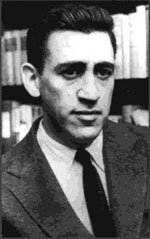
‘호밀밭의 파수꾼’으로 유명한 작가 샐린저의 젊은 시절 모습.
●All my best thoughts were stolen by the ancients.(나의 가장 훌륭한 생각들은 모두 이미 고대인들이 무단 차용하였다.) -미국 사상가·시인 에머슨(Ralph Waldo Emerson·1803~1882)
●When something can be read without effort, great effort has gone into its writing.(저자가 어떤 것을 쓰는 데 엄청난 노력을 쏟아 부어야만 독자가 수월하게 읽을 수 있다). -스페인 작가·극작가 폰셀라(Enrique Jardiel Poncela·1901~1952)
●If I don?t write to empty my mind, I go mad.(글을 써서 마음을 비우지 않으면 나는 미친다.) -영국 낭만파 시인 바이런 (Lord George Gordon Byron·1788~1824)
●To withdraw myself from myself has ever been my sole, my entire, my sincere motive in scribbling at all.(내가 내 자신으로부터 벗어나는 것, 그것은 항상 적어도 일필휘지로 휘갈겨 쓸 때의 나의 유일한, 나의 모든, 나의 진지한 동기였다.) -바이런
●A writer is someone who can make a riddle out of an answer.(작가는 답에서 수수께끼를 만들 수 있는 사람이다.) -오스트리아 작가 크라우스(Karl Kraus·1874~1936)
‘광기가 일러주고, 이성이 쓰고’
●Metaphors have a way of holding the most truth in the least space.(은유는 최소의 면적에서 최대의 진리를 간직하는 방법이다.) -미국의 베스트셀러 작가 카드(Orson Scott Card·1951~)
●They lard their lean books with the fat of others? works.(그들은 다른 사람 작품의 지방으로 지방이 적은 자기들 책을 꾸민다.) -영국 문필가 버턴(Robert Burton·1577~1640)의 1621년 수필집 ‘우울의 해부(The Anatomy of Melancholy)’에서.
●What I like in a good author is not what he says, but what he whispers.(훌륭한 작가에게서 내가 좋아하는 것은 그가 말하는 것이 아니라 내밀한 이야기를 하는 것이다.) -미국 수필가·평론가 스미스(Logan Pearsall Smith·1865~1946)
●The best style is the style you don?t notice.(가장 좋은 스타일은 사람들이 알지 못하는 스타일이다.) -영국 작가 서머싯 몸(William Somerset Maugham·1874~1965)
●A good style should show no signs of effort. What is written should seem a happy accident.(훌륭한 문체가 되려면 노력의 흔적이 보여서는 안 된다. 쓴 글이 행복한 우연인 것처럼 보여야 한다.) -서머싯 몸
●A man will turn over half a library to make one book.(한 인간이 한 권의 책을 내기 위해서는 서재(書齋) 반을 뒤집는다.) - 영국 시인·비평가·수필가·사전편찬자 새뮤얼 존슨(Samuel Johnson·1709~1784)
●Authors and lovers always suffer some infatuation, from which only absence can set them free.(저자들과 연인들은 항상 심취한다. 여기에서 이탈하는 것만이 이들을 자유롭게 함에도.) -새뮤얼 존슨
●The two most engaging powers of an author are to make new things familiar and familiar things new.(작가의 가장 매력적인 힘 두 가지는 새로운 것을 친숙하게 만드는 것이고, 친숙한 것을 새롭게 만드는 것이다.) -새뮤얼 존슨
●The most beautiful things are those that madness prompts and reason writes.(가장 아름다운 것은 광기가 일러주고 이성이 쓴 내용이다.) -프랑스 소설가·비평가 앙드레 지드(Andre Gide·1869~1951)
●An original writer is not one who imitates nobody, but one whom nobody can imitate.(독창적인 작가는 누구도 모방하지 않는 사람이 아니라 누구도 모방할 수 없는 사람이다.) -‘프랑스 문학 로맨티시즘 창시자(founder of Romanticism in French literature)’라고 불린 프랑스 작가·정치가·외교관 샤토브리앙(chateaubriand·1768~1848)
●Who writes poetry imbibes honey from the poisoned lips of life.(시를 쓰는 사람은 인생이라는 독 묻은 입에서 꿀을 빨아들인다.) -미국 시인 베넷(William Rose Benet·1886~1950)
●The wastebasket is a writer?s best friend.(휴지통이 글을 쓰는 사람의 가장 좋은 친구다.) -폴란드 태생 미국 작가(1978년 노벨문학상 수상) 아이작 싱어(Isaac Bashevis Singer·1902~1991)
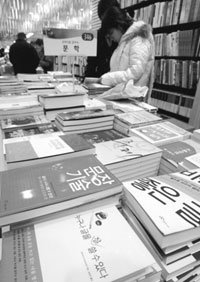
요즘 서점가에는 글쓰기에 관한 다양한 책이 쏟아져 나오고 있다.
●Drama, instead of telling us the whole of a man?s life, must place him in such a situation, tie such a knot, that when it is untied, the whole man is visible.(드라마는 한 인간의 삶 전체를 말하지 말고, 그 사람을 어떤 상황 속에 갖다놓고 어떤 매듭을 지어놓은 다음, 그 매듭이 풀릴 때 모든 인간을 볼 수 있게 해야 한다.) -톨스토이
‘처음엔 가슴으로 써라’
●No thinking - that comes later. You must write your first draft with your heart. You rewrite with your head. The first key to writing is to write, not to think!(생각 금지 - 생각은 나중에 떠오르는 법. 처음에는 가슴으로 써라. 다음에는 머리로 고쳐 써라. 글을 쓰는 첫 번째 열쇠는 생각하는 것이 아니라 쓰는 것이다.) -2000년 미국 영화 ‘파인딩 포레스터(Finding Forrester)’ 극중 대사. ※노작가 포레스터가 로버트 브라운(Robert Brown)이 연기한 신출내기 작가 지망생 자말 월리스(Jamal Wallace)에게 한 말이다. 극중 숀 코너리(Sean Connery)가 연기한 작가 윌리엄 포레스터(William Forrester)는 여러 가지 점에서 ‘호밀밭의 파수꾼’을 쓰고 은둔한 전설적 미국 작가 샐린저(Jerome David Salinger)를 떠올리게 한다.
[작문] 초고는 완전하게 쓰려고 하지 말고 그냥 거침없이 써라. 그런 다음 되돌아가서 각 절을 검토하라. 과도한 단어는 솎아내고 완전한 단어를 찾아내어 이야기가 노래처럼 들리게 하라.
Let the first draft flow without trying to make it perfect. Then go back and examine each passage, trimming the excess words and seeking the perfect words to make your story sing.
●A word is not the same with one writer as with another. One tears it from his guts. The other pulls it out of his overcoat pocket.(말이란 작가마다 서로 다르다. 자기의 창자에서 뜯어내는 작가가 있는가 하면 자기의 오버코트 주머니에서 끄집어내는 작가가 있다.) -프랑스 사상가 시인 샤를 페기(Charles Peguy·1873~1914)
●By the way, everything in life is writable about if you have the outgoing guts to do it, and the imagination to improvise. The worst enemy to creativity is self-doubt.(그런데 삶의 모든 것을 쓸 수 있다. 그것을 쓸 만한 외향적인 용기와 즉석에서 쓸 수 있는 상상력이 있다면 말이다. 창조에 대한 최악의 적은 자기불신이다.) -미국 시인·소설가 실비아 플라스(Sylvia Plath·1932~1963)
●I would hurl words into this darkness and wait for an echo, and if an echo sounded, no matter how faintly, I would send other words to tell, to march, to fight, to create a sense of hunger for life that gnaws in us all.(나는 이 어둠 속으로 말을 던져 메아리를 기다리겠다. 그리고 아무리 희미하다 할지라도 반향이 들리면, 다른 말을 던져 말하고 행진하고 싸우고, 우리 모두를 괴롭히는 삶을 벗어나기 위하여 헝그리 정신을 창조하고 싶다.) -미국 흑인 작가 라이트(Richard Wright·1908~1960)
‘순간의 생각을 써라’
●It is necessary to write, if the days are not to slip emptily by. How else, indeed, to clap the net over the butterfly of the moment? For the moment passes, it is forgotten; the mood is gone; life itself is gone. That is where the writer scores over his fellows: he catches the changes of his mind on the hop.(삶이 헛되이 지나가버리지 않게 하려면 글 쓰는 일이 필요하다. 정말, 나비와 같은 그 순간을 그물로 낚아채려면 달리 어찌하란 말인가? 그 순간은 지나가고 잊히고, 그 감정은 가고 없어지고, 삶 자체가 가고 없어지기 때문이다. 이것이 작가가 그의 친구들보다 우위에 있는 점이다. 작가는 마음의 변화를 불시에 포착한다.) -영국 여류시인·소설가 비타 색빌-웨스트(Vita Sackville-West·1892~1962)
●The pages are still blank, but there is a miraculous feeling of the words being there, written in invisible ink and clamoring to become visible.(그 페이지들은 여전히 공백이다. 그러나 단어의 신비한 감정이 거기에 있다. 눈에 보이지 않는 잉크로 씌어진, 보이게 될 것이라고 외치기 때문이다.) -러시아계 미국 소설가 나바코프(Vladimir Nabakov·1899~1977)
●The story I am writing exists, written in absolutely perfect fashion, some place, in the air. All I must do is find it, and copy it.(공중 어딘가에 정말 완전한 형태로 쓰여진 내가 쓰고 있는 이야기가 있다. 내가 해야 하는 일은 그것을 찾아서 복사하는 일이다.) -프랑스 작가 르나르(Jules Renard·1864~1910)
●A prose writer gets tired of writing prose, and wants to be a poet. So he begins every line with a capital letter, and keeps on writing prose.(산문을 쓰다 싫증난 산문작가는 시인이 되고 싶어한다. 그래서 그는 줄마다 대문자로 시작한다. 그러고는 계속해서 산문을 쓴다.) -미국 성직자·수필가 크로터스(Samuel McChord Crothers·1857~1927)의 1920년작 ‘경험이라는 초등학교(The Dame School of Experience)’ 중 ‘딴사람이 되고 싶어하는 자연스러운 욕망(Every Man´s Natural Desire to Be Somebody Else)’ 에서
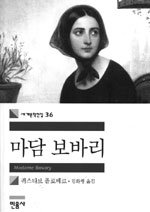
누보로망의 원류 플로베르의 대표작 ‘마담 보바리’.
●Words - so innocent and powerless as they are, as standing in a dictionary, how potent for good and evil they become in the hands of one who knows how to combine them.(단어 - 사전에 있을 땐 정말로 순진하고 힘없는 것들이 그것들을 섞을 줄 아는 사람들의 손아귀에 들어가면 얼마나 강한 선과 악으로 변하는가!) -미국 소설가 호손(Nathaniel Hawthorne·1804~1864)
●Writing, I think, is not apart from living. Writing is a kind of double living. The writer experiences everything twice. Once in reality and once in that mirror which waits always before or behind.(글쓰기는 삶을 사는 것과 다르지 않다고 생각한다. 글쓰기는 이중으로 사는 것과 같다. 작가는 모든 것을 두 번 경험한다. 현실생활에서 한 번, 항상 앞이나 뒤를 비춰주는 거울 속에서 한 번.) -미국 전기(傳記)작가(biographer) 캐서린 보윈(Catherine Drinker Bowen·1897~1973)
●To me, the greatest pleasure of writing is not what it?s about, but the inner music the words make.(나에게, 글쓰기의 가장 큰 즐거움은 글의 소재가 아니라 말이 만들어낸 영적 음악이다.) -미국 소설가 카포티(Truman Capote·1924~1984)
●Write down the thoughts of the moment. Those that come unsought for are commonly the most valuable.(그 순간의 생각을 써라. 일부러 골똘히 짜내지 않고 나오는 생각이 가장 가치 있는 생각인 경우가 많다.) -영국 수필가·정치가·철학자 베이컨(Francis Bacon·1561~1626)
‘말들이 저절로 나타났다’
●The expression “to write something down” suggests a descent of thought to the fingers whose movements immediately falsify it.(표현, 다시 말해서 ‘뭔가를 쓴다는 것’은 사상이 손가락으로 내려가서 그 손가락의 움직임이 바로 그것을 변조하는 것을 말한다.) -미국 소설가 가스(William Howard Gass·1924~)
●It seems to me that those songs that have been any good, I have nothing much to do with the writing of them. The words have just crawled down my sleeve and come out on the page.(지금까지의 저 노래들이 아무리 좋다 할지라도, 나는 그것들의 작사·작곡과는 별로 관련이 없다. 말들이 그냥 나의 소맷자락을 타고 내려와 페이지 위에 나타났다.) -미국 가수·작사가·작곡가 조앤 바에즈(Joan Baez·1941~)
●When a man is in doubt about this or that in his writing, it will often guide him if he asks himself how it will tell a hundred years hence.(글을 쓰면서 이렇게 쓸까 저렇게 쓸까 망설일 때, 지금부터 100년 후 그것이 어떻게 말할까를 스스로에게 묻는다면 필자를 잘 인도하는 경우가 종종 있다.) -영국 소설가·수필가·비평가 새뮤얼 버틀러(Samuel Butler·1835~1902)
●Let me walk through the fields of paper touching with my wand, dry stems and stunted butterflies.(종이라는 들판 여기저기를 걷고 싶다. 지팡이를 들고, 마른 가지를 꺾어 들고, 조그마한 나비와 함께 들판을 어루만지면서) -영국 출신 미국 시인 드니즈 레버토브(Denise Levertov·1923~1997)의 ‘공책(空冊) 산책(A Walk through the Notebooks)’에서
●When we see a natural style we are quite amazed and delighted, because we expected to see an author and find a man.(자연스러운 스타일을 보면, 아주 놀랍고 기쁘다. 저자를 보고 인간을 발견하기를 기대했기 때문이다.) -프랑스 철학자·수학자 파스칼(Blaise Pascal·1623~1662)의 ‘팡세’(불어 Pense?es 영어 Thoughts)에서
●I asked Ring Lardner the other day how he writes his short stories, and he said he wrote a few widely separated words or phrases on a piece of paper and then went back and filled in the spaces.(나는 전번에 링 라드너에게 단편소설을 어떻게 쓰느냐고 물었다. 한 장의 종이 위에 단어들이나 구절들을 멀리 갈라놓는다. 그런 다음 빈 공간을 메운다고 그는 말했다.) -미국 저널리스트 로스(Harold Wallace Ross·1892~1951)
●When you are describing/ A shape, or sound, or tint;/ Don?t state the matter plainly./ But put it in a hint;/ And learn to look at all things,/ With a sort of mental squint.(형태, 소리, 빛깔을/ 묘사할 때,/ 그대로 말하지 마라./ 암시를 주어라./ 정신적 곁눈질 같은 것으로/ 모든 것을 보는 법을 배워라.) -영국 작가·수학자·논리학자·사진작가 루이스 캐럴(Lewis Carroll·1832~1898)
●A perfectly healthy sentence, it is true, is extremely rare. For the most part we miss the hue and fragrance of the thought; as if we could be satisfied with the dews of the morning or evening without their colors, or the heavens without their azure.(사실 완전히 건전한 문장은 아주 드물다. 대부분 우리는 그 문장이 주는 색깔과 향기를 지각하지 못한다. 아침이나 저녁의 이슬은 색깔이 없어도 만족할 수 있고, 하늘은 담청색(淡靑色)이 없어도 만족할 수 있는 것처럼.) -미국 사상가·작가 소로(Henry David Thoreau·1817~1862)
●What would there be in a story of happiness? Only what prepares it, only what destroys it can be told.(행복을 주제로 한 이야기에 무엇이 들어 있을까? 이야기될 수 있는 것은 행복을 준비하는 것, 행복을 파괴하는 것뿐이다.) -프랑스 소설가·비평가(1947년 노벨문학상 수상) 앙드레 지드(Andre Gide·1869~1951)
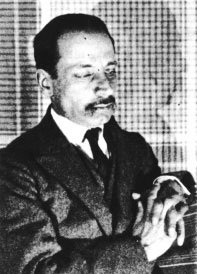
오스트리아 태생의 독일 서정시인 라이너 마리아 릴케.
‘말은 희미한 그림자’
●Words are but the vague shadows of the volumes we mean. Little audible links, they are, chaining together great inaudible feelings and purposes.(말은 우리가 의미하는 총체적인 것의 희미한 그림자일 뿐이다. 말은 들을 수 없는 커다란 감정과 목적을 엮어주는 들을 수 있는 조그마한 연결고리다.) -미국 소설가 드라이저(Theodore Dreiser·1871~1945)
●I?d rather be caught holding up a bank than stealing so much as a two-word phrase from another writer; - omitted -but when someone has the wit to coin a useful word, it ought to be acclaimed and broadcast or it will perish.(다른 작가로부터 두 단어로 이루어진 한 구절씩이나 표절하느니 차라리 은행을 강탈하다 잡히겠다. - 중략(中略)- 누군가가 재치 있게 유용한 신어를 만들어내면 갈채를 보내며 퍼뜨려야 한다. 그렇지 않으면 사라져 버릴 것이다.) -작가 잭 스미스(Jack Smith)
●It is the little writer rather than the great writer who seems never to quote, and the reason is that he is never really doing anything else.(결코 인용하지 않는 것처럼 보이는 작가는 위대한 작가라기보다는 오히려 시시한 작가다. 그런 작가는 결코 인용하지 않는 것처럼 보이게 하는 일 외에는 실제로 하는 일이 없다는 데 그 이유가 있다.) -영국 수필가·의사 엘리스(Henry Havelock Ellis·1859~1939)
●Your manuscript is both good and original; but the part that is good is not original, and the part that is original is not good.(당신의 원고는 훌륭하기도 하고 독창적이기도 하다. 그러나 훌륭한 부분은 독창적이 아니다. 그리고 독창적인 부분은 훌륭하지 않다.) -작자 미상(Author Unknown)
●I am a man, and alive. For this reason I am a novelist. And being a novelist, I consider myself superior to the saint, the scientist, the philosopher, and the poet, who are all great masters of different bits of man alive, but never get the whole hog.(나는 인간이다. 그리고 살아 있다. 이러한 이유 때문에 나는 소설가다. 소설가이기 때문에 나는 내 자신을 성인, 과학자, 철학자 그리고 시인보다 우수하다고 생각한다. 이 사람들은 모두 살아 있는 인간의 서로 다른 작은 부분에 도통한 사람이지만 전체적인 완전함을 결코 얻지를 못하기 때문이다.) - 영국 소설가·단편작가·시인·수필가 로렌스(David Herbert Lawrence·1885~1930)
●It is impossible to discourage the real writers - they don?t give a damn what you say, they?re going to write.(진정한 저자를 낙담시키기란 불가능하다. -그들은 사람들이 말하는 것을 조금도 개의치 않고 쓰려고 하기 때문이다.) -미국 소설가·사회비평가(1930년 노벨문학상 수상) 싱클레어 루이스(Harry Sinclair Lewis·1885~1951)
●Let?s hope the institution of marriage survives its detractors, for without it there would be no more adultery and without adultery two thirds of our novelists would stand in line for unemployment checks.(결혼이라는 제도가 이 제도를 비방하는 사람들보다 오래 존재하도록 희망하자. 결혼이 없다면 더 이상 간통이 없을 것이기 때문이며 간통이 없다면 소설가의 3분의 2는 실직 전표를 받기 위해 줄을 설 것이기 때문이다.) -미국 작가·도서 비평가 프레스코트(Peter S. Prescott·~2004) (book critic)
●True Ease in writing comes from art, not chance, as those move easiest who have learn?d to dance.(글을 정말 쉽게 쓴다는 것은 우연(偶然)이 아니라 기술이다. 춤을 배워본 사람이 가장 잘 움직이는 것처럼 말이다.) -영국 시인 포프 (Alexander Pope·1688~1744)의 ‘비평론(An Essay on Criticism)’에서
●An author in his book must be like God in the universe, present everywhere and visible nowhere.(책 속의 저자는 어디에나 존재하나 어디서도 볼 수 없는 우주 속의 신과 같아야한다.) -프랑스 소설가 플로베르(Gustave Flaubert·1821~1880)
걸으며 써라
●There?s only one person who needs a glass of water oftener than a small child tucked in for the night, and that?s a writer sitting down to write.(밤에 어린아이에게 담요를 꼭 덮어주는 것보다 여러 번 한 잔의 물을 필요로 하는 사람이 딱 한 사람 있다. 앉아서 글 쓰는 문필가다.) -미국 저널리스트 겸 작가 맥래플린(Mignon McLaughlin·1913~1983)의 ‘The Second Neurotic?s Notebook’(1966)에서
●Sleep on your writing;/ take a walk over it;/ scrutinize it of a morning;/ review it of an afternoon;/ digest it after a meal;/ let it sleep in your drawer a twelvemonth;/ never venture a whisper about it to your friend,/ if he be an author especially.(잠자면서 글을 써라./ 걸으면서 글을 써라./ 아침 같은 때에 그것을 음미하라./ 오후 같은 때에 그것을 검토하라./ 식사 후에 그것을 삭여라./ 12개월 동안 그것을 서랍 속에 잠재워라./ 친구에게 그것에 대하여 속삭이는 모험을 하지 마라./ 그가 특히 작가라면.) -미국 교사·작가 올커트(Amos Bronson Alcott·1799~1888)
●i never think at all when i write nobody can do two things at the same time and do them both well.(나는 글을 쓸 때는 결코 생각하지 않는다. 동시에 두 가지 일을 하면서 두 가지를 다 잘 할 수 있는 사람은 없다.) - 미국 신문기자 시인 극작가 마퀴스(Don Marquis·1878~1937)의 작품에서 ※그의 작품에 1인칭 시점(視點 point of view)으로 서술되는 ‘아치(Archy)’라는 캐릭터가 등장한다. 아치는 시적 명상을 하며 타자기의 시프트 키를 누르지 못한다. 그래서 대문자 ‘I’가 아니라 소문자로 되어 있다.
●The good writers touch life often. The mediocre ones run a quick hand over her. The bad ones rape her and leave her for the flies.(일류 작가는 인생을 자주 접한다. 이류 작가는 인생을 손만 대다가 잽싸게 뗀다. 삼류 작가는 인생을 강간하고 버리고 도망친다.) -미국 작가 브래드버리(Ray Douglas Bradbury·1920~)
●Having imagination, it takes you an hour to write a paragraph that, if you were unimaginative, would take you only a minute. Or you might not write the paragraph at all.(상상력을 가지면 그걸 한 단락 쓰는 데 한 시간이 걸린다. 상상력이 없다면 1분이 걸릴 것이다. 혹은 그 단락을 전혀 쓰지 못할 것이다.) -미국 칼럼니스트 애덤스(Franklin Pierce Adams·1881~1960)
●You could compile the worst book in the world entirely out of selected passages from the best writers in the world.(전적으로, 이 세상에서 가장 훌륭한 작가에게서 뽑은 문장을 바탕으로 책을 쓴다면 이 세상에서 가장 나쁜 책을 만들 수 있을 것이다.) -영국 비평가 · 시인 · 소설가 체스터턴(Gilbert Keith Chesterton·1874~1936)
●Life can?t ever really defeat a writer who is in love with writing, for life itself is a writer?s lover until death - fascinating, cruel, lavish, warm, cold, treacherous, constant.(인생은 글쓰기를 사랑하는 자를 결코 정말로 좌절시킬 수 없다. 죽을 때까지 삶 자체 -매혹적인, 잔인한, 사치스러운, 따뜻한, 차가운, 위험한, 안정적인 -가 작가의 연인이기 때문이다.) -미국 소설가 퍼버(Edna Ferber·1887~1968) ※그녀의 작품 ‘자이언트 Giant’(1952)는 1956년 영화화됐다. 텍사스 석유 왕 매카시(Glenn McCarthy)의 삶을 재구성한 것이다. 엘리자베스 테일러(Elizabeth Taylor), 록 허드슨(Rock Hudson), 제임스 딘(James Dean)이 주연을 맡았다. 광활한 텍사스 농장을 배경으로 2세대에 걸쳐 전개되는 농장주 일가의 이야기를 그린 작품이다. 500만달러의 제작비를 투입한 1950년대식 블록버스터다. 1957년 제29회 아카데미상 10개 부문 후보에 올라 아카데미 감독상을 수상했다. 영화 개봉을 2주일 앞두고 교통사고로 사망한 제임스 딘의 유작이다.
●The writer writes in order to teach himself, to understand himself, to satisfy himself; the publishing of his ideas, though it brings gratification, is a curious anticlimax.(작가는 자신을 가르치기 위하여, 자신을 이해하기 위하여, 자신을 만족시키기 위하여 글을 쓴다. 자기의 사상을 출판한다는 것은 만족을 가져다주기는 하지만 묘한 역(逆)클라이맥스다.) -미국 평론가 겸 편찬자 케이진(Alfred Kazin·1915~1998)
●The good writing of any age has always been the product of someone?s neurosis, and we?d have a mighty dull literature if all the writers that came along were a bunch of happy chuckle-heads.(어느 시대든 간에 훌륭한 작품은 항상 누군가의 노이로제 산물이다. 다가오는 모든 작가가 한 떼거리의 행복한 얼간이들이라면, 우리는 대단히 무미건조한 문학을 갖게 될 것이다.) -미국 소설가 스타이런(William Clark Styron·1925~2006)
‘훌륭한 작품은 노이로제의 산물’
●There is no royal path to good writing; and such paths as do exist do not lead through neat critical gardens, various as they are, but through the jungles of self, the world, and of craft.(좋은 글을 쓰는 지름길은 없다. 있는 길은 다양하지만, 깔끔하고 정밀하게 단장한 정원을 통하는 것이 아니라 자아, 세상, 그리고 재능의 정글을 통한다.) -미국 작가 웨스트(Jessamyn West·1902~1984)
●A good novel tells us the truth about its hero; but a bad novel tells us the truth about its author.(좋은 소설은 우리에게 그 소설의 주인공에 대한 진리를 말해주지만, 나쁜 소설은 우리에게 저자에 대한 진실을 말해준다.) -영국 비평가·시인·수필가·소설가 체스터턴(Gilbert Keith Chesterton·1874~1936)
●Writing a book is a horrible, exhausting struggle, like a long bout of some painful illness. One would never undertake such a thing if one were not driven on by some demon whom one can neither resist nor understand.(책을 쓴다는 것은 고통스러운 오랜 병처럼 피 말리는 끔직한 버둥질이다. 우리가 거부할 수도 없고 이해할 수도 없는 어떤 악마가 부추기지 않는다면 그런 일을 결코 착수하지 않을 것이다.) -영국 소설가 오웰 (George Orwell·1903~1950)의 1946년 평론 ‘Why I Write’에서
●He that uses many words for explaining any subject, doth, like the cuttlefish, hide himself for the most part in his own ink.(어떤 주제를 설명하기 위하여 많은 단어를 사용하는 사람은 오징어처럼 자신의 잉크로 자신의 대부분을 숨긴다.) -영국 박물학자 · 식물학자 레이(John Ray·1627~1705) ※doth: (고어·시어) DO1의 3인칭·단수·직설법·현재
●Find out the reason that commands you to write; see whether it has spread its roots into the very depth of your heart; confess to yourself you would have to die if you were forbidden to write.(쓰라고 명령하는 이유를 찾아내라. 그 이유의 뿌리가 가슴의 아주 깊은 곳까지 뻗어 들어가있는지를 살펴라. 만약 쓰는 것이 불가능하면 죽을 수밖에 없다고 자신에게 고백하라.) - 오스트리아 태생 독일 시인 라이너 마리아 릴케 (Rainer Maria Rilke·1875~1926)
‘포기하지 않자 유명해져’
●Books want to be born: I never make them. They come to me and insist on being written, and on being such and such.(책은 태어나고 싶어한다. 나는 결코 책을 만들지 않는다. 책이 나에게 와서 써달라고 우긴다. 계속해서 그렇게 우긴다.) -영국 소설가 · 수필가 · 비평가 새뮤얼 버틀러(Samuel Butler·1835~1902)
●It took me fifteen years to discover I had no talent for writing, but I couldn?t give it up because by that time I was too famous.(내가 글을 쓰는 재간이 없다는 것을 발견하는 데 15년이 걸렸다. 그러나 나는 포기하지 않았다. 그때가 되자 나는 너무 유명하게 되었기 때문이다.) -미국 연극비평가·배우·유머작가 벤칠리(Robert Charles Benchley·1889~1945)
●There are thousands of thoughts lying within a man that he does not know till he takes up the pen and writes.(한 인간의 마음속에는 자기가 알지 못하는 수천 가지의 생각이 있다; 펜을 들고 쓸 때까지는.) -영국 소설가 새커리(William Makepeace Thackeray·1811~1863)
●The difference between the right word and the almost right word is the difference between lightning and a lightning bug.(올바른 단어와 거의 올바른 단어의 차이는 번개와 반딧불의 차이다.) -미국 작가 마크 트웨인(Mark Twain·1835~1910)
●Substitute “damn” every time you?re inclined to write “very;” your editor will delete it and the writing will be just as it should be.(“very”라고 쓰고 싶을 때마다 “damn”을 써라. 그러면 편집자가 그걸 지우고 마땅한 것으로 바꿀 것이다.) -마크 트웨인
●I was working on the proof of one of my poems all the morning, and took out a comma. In the afternoon I put it back again.(나는 나의 여러 편의 시(詩) 중 하나를 오전 내내 교정하고 있었다. 콤마 하나를 뺐다. 오후에 다시 그 콤마를 집어넣었다.) -아일랜드의 재사(才士)·소설가·극작가·시인 오스카 와일드(Oscar Wilde·1854~1900)
●There is no such thing as a moral or an immoral book. Books are well written or badly written.(도덕적인 책이나 부도덕적인 책 같은 것은 없다. 잘 써진 책이 있거나 잘못 써진 책이 있을 뿐이다.) -와일드
●My own business always bores me to death; I prefer other people?s.(나의 직업은 항상 나를 죽도록 지겹게 한다. 나는 다른 사람의 직업을 더 좋아한다.) -와일드
●The public have an insatiable curiosity to know everything, except what is worth knowing. Journalism, conscious of this, and having tradesman-like habits, supplies their demands.(일반 국민은 알 가치가 있는 것을 빼놓고 모든 것을 알고자 하는 탐욕스러운 호기심을 갖고 있다. 이것을 알고 있는 그리고 소매상인과 같은 기질을 갖고 있는 저널리즘은 일반 국민이 요구하는 것을 공급한다.) -와일드
●The difference between literature and journalism is that journalism is unreadable and literature is not read.(문학과 저널의 차이점은 저널은 읽을 가치가 없다는 것이고 문학은 읽히지 않는다는 것이다.) -와일드
●Journalism justifies its own existence by the great Darwinian principle of the survival of the vulgarist.(저널리즘은 ‘속물주의자 생존’이라는 다윈의 위대한 원리에 의해서 자신의 존재를 정당화한다.) -와일드
●As for my next book, I am going to hold myself from writing it till I have it impending in me: grown heavy in my mind like a ripe pear; pendant, gravid, asking to be cut or it will fall.(나의 다음 책에 관하여 말하자면, 임박할 때까지는 그것을 안 쓴다. 익은 배처럼 나의 마음속에서 무겁게 클 때까지; 꽉 차 늘어져 자르지 않으면 떨어질 때까지.) - 영국 여류작가 울프(Virginia Stephen Woolf·1882~1941)
●The best time for planning a book is while you?re doing the dishes.(책을 써야겠다고 궁리하는 가장 좋은 시점은 설거지하고 있을 때다.) -영국 여류 추리소설작가(crime writer) 크리스티(Agatha Christie·1890~1976)
●A writer?s mind seems to be situated partly in the solar plexus and partly in the head.(작가의 마음은 부분적으로는 가슴(감성)에, 부분적으로는 머리(지성)에 위치해 있다.) -캐나다 소설가 윌슨(Ethel Davis Wilson·1888~1980)
●If there?s a book you really want to read, but it hasn?t been written yet, then you must write it.(정말 읽고 싶으나 아직 그런 책이 씌어진 적이 없다면 그런 책을 써야 한다.) -미국 여류작가. 노벨문학상 수상. 랜덤하우스 출판사 편집자 모리슨(Toni Morrison·1931~)
‘말할 수 없는 것을 말하라’
●The role of a writer is not to say what we all can say, but what we are unable to say.(작가의 임무는 모두가 말할 수 있는 것을 말하는 것이 아니라 말할 수 없는 것을 말하는 것.) -미국 여류 소설가 아나이스 닌(Anais Nin·1903~1977)
●It seems to me that the problem with diaries, and the reason that most of them are so boring, is that every day we vacillate between examining our hangnails and speculating on cosmic order.(내가 생각하기에 일기에서 다루는 문제와 일기의 대부분이 아주 지겨운 이유는 우리가 날이면 날마다 우리의 손거스러미를 살펴보는 것과 우주의 질서를 사유하는 것 사이를 왔다갔다하기 때문이다.) -미국 소설가 앤 베티(Ann Beattie·1947~)
●No man should ever publish a book until he has first read it to a woman.(맨 먼저 여자에게 읽어주기 전까지는 누구도 결코 책을 출판해서는 안 된다.) -미국 평론가 겸 전기 작가 브룩스(Van Wyck Brooks·1886~1963)
●You write to communicate to the hearts and minds of others what?s burning inside you. And we edit to let the fire show through the smoke.(문필가는 마음속에 불타고 있는 것을 다른 사람의 가슴과 머리에 전달하기 위하여 글을 쓴다. 편집자는 그 불이 연기를 제치고 나와 독자가 볼 수 있도록 편집한다.) -편집·출판 경험을 겸비한 작가 아서 폴로트닉(Arthur Polotnik)
●Publication is the auction of the Mind of Man.(출판이란 인간의 마음을 경매 부치는 것이다.) -미국 여류시인 디킨슨(Emily Elizabeth Dickinson·1830~1886)
●The old nobility would have survived if they had known enough to become masters of printing materials.(옛 귀족들이 대가(大家)가 될 정도로 인쇄도구에 대한 충분한 지식이 있었더라면, 그들은 살아남았을 것이다.) - 프랑스 황제 나폴레옹 보나파르트(Napoleon Bonaparte·1769~1821)
















![[영상] 미친 ‘사과 값’의 나라, 생산지부터 마트까지 ‘사과 길’ 추적하다](https://dimg.donga.com/a/570/380/95/1/carriage/MAGAZINE/images/shindonga_home_top_2023/6621b46f046ed2738276.jpg)




![[영상] 푸바오 살던 고향은 대한민국 경기도 용인시](https://dimg.donga.com/a/380/211/95/1/ugc/CDB/SHINDONGA/Article/66/1f/62/dc/661f62dc1b69d2738276.jpg)

